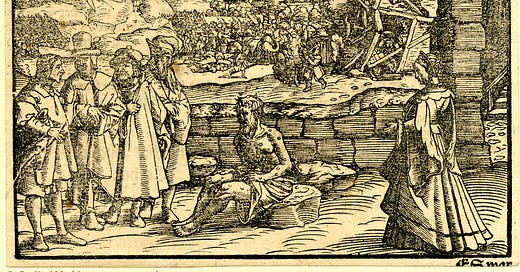Let us return again to the life of Father Zosima. If you missed Part 1, where Zosima recounts the spiritual awakening of his brother Markel upon his deathbed, you can find that here.
Baylor Reads: Dostoevsky
Note: If you prefer a recording purely of the read-aloud without my brief preface and note of context, you may find it below. Otherwise, simply click the Article Voiceover at the top.
Note, I accidentally switched translations in this second post. The first part included Constance Garnett’s translation, while this one is David McDuff’s, which I find to be slightly more antiquated, but good enough.
(B) Concerning Holy Scripture in the Life of Father Zosima
Then dear mother and I were left alone. It was not long before good acquaintances began to counsel her, saying: 'Look, now you have only one son left, and you are not poor, you have capital, so why not follow the example of others and send your son to St Petersburg? If he stays here you may deprive him of a noble destiny.' And they advised dear mother to take me to St Petersburg and have me enrolled in the Cadet Corps, in order that I might subsequently enter the Imperial Guard.
For a long time dear mother hesitated: how was she to part with the last of her sons? In the end, however, she made her decision, though not without many tears, in the hope of contributing towards my happiness. She took me to St Petersburg, secured me a place in the Corps and after that I never saw her again: for at the end of three years she too died, having all three of them grieved and trembled for us both.
Of my parental home I have retained only precious memories, for a person can have no memories more precious than those of his earliest childhood in his parental home, and this is nearly always so, if there is in the family even the slightest degree of love and union. Indeed, precious memories may be retained even from the very worst of families, it only your soul is capable of seeking that which is precious. Among my domestic memories I also include my memories of biblical history, which in my parental home, though only a child, I was very curious to learn.
In those days I had a book, a biblical history, with beautiful pictures and the title One Hundred and Four Sacred Tales of the Old and New Testaments, and using it I also learned to read. Even now it sits upon my shelf here, and I guard it like a precious memory. But I recall that even before I learned to read, there visited me a certain spiritual awakening, when I was only eight years of age.
On the Monday of Holy Week dear mother took me alone (I do not recall where my brother was at that time) to the temple of the Lord, for morning Mass. It was a sunny day, and as I remember it now I seem to see once again the incense rising from the censer and quietly floating aloft, and up in the cupola, through the narrow little window, God's rays fairly streaming into the church down upon us, and, as it rose towards them in waves, how the incense appeared to dissolve in them. I watched in tender emotion, and for the first time in my life I accepted with understanding the first seed of God's word into my soul.
Out into the midst of the temple came a young lad bearing a large book, so large that it seemed to me he could hardly carry it, and placed it upon the lectern, opened it and began to read, and suddenly for the first time I understood some of it - for the first time in my life I understood what was read in the temple of God. There was a man in the land of Uz,' perfect and upright, and his substance was such-and-such, so-and-so many camels, so-and-so many sheep and she-asses, and his sons went and feasted in their houses, and he loved them greatly and said prayers for them to God: for perhaps they had sinned in feasting.
And then when the sons of God went to present themselves before the Lord, Satan came along with them, and said he had come from going to and fro in the earth and from walking up and down in it. Hast thou considered my servant Job?'* God asked him. And God boasted to Satan, pointing to his great and perfect servant. And Satan smiled mockingly at God's words: Deliver him unto me and you will see that your servant will raise his voice against you and curse your name.' And God delivered his righteous one, whom he so loved, unto Satan, and Satan smote his sons and his daughters and cattle, and scattered his wealth, suddenly, as by one of God's thunderbolts, and Job rent his mantle, and fell down upon the Bround, and began to wail: 'Naked came I out of my mother's womb, and naked shall I return thither: the Lord gave, and the Lord hath taken away: blessed be the name of the Lord from this day hence and ever more!'
Fathers and teachers, look leniently upon my tears now - for all my youth seems to rise up before me once again and I seem to breathe now as I breathed then with my paltry lungs of an eight-year-old boy, and feel, as I did then, surprise, confusion and joy. And those camels so engaged my imagination then, and Satan, who could talk to God in such a manner, and God, delivering his servant to ruin, and his servant, exclaiming: "Blessed be your name, in spite of that you punish me? And afterwards the sweet and quiet singing in the temple: 'Let my prayer arise'," and again the incense from the priest's censer and the kneeling prayer!
Ever since that day - why, only yesterday I took it into my hands again - I have been unable to read that most biblical of tales without tears. What unimaginable greatness and mystery it contains! Later on I heard the words of the mockers and blasphemers, proud words: how could the Lord deliver the most beloved of his saints to the idle ploys of Satan, take his children from him, smite him with illness and sore boils, so that he took him a potsherd to scrape the pus from his wounds, and for what? merely in order to be able to boast to Satan: 'There, that is what my perfect servant is able to endure for my sake!'
But the greatness of it is that here there is a mystery - that here the earth's transitory countenance and eternal truth have come into contact with each other. In the face of earthly truth an act of eternal truth is accomplished. Here the Creator, as in the first days of Creation, completing each day with an utterance of praise - 'That which I have made is good' - looks at Job and again praises one of his creations. But Job, in praising the Lord, serves not only him, but also the whole of his creation from generation to generation and from age to age, ever more, for to that he has been preordained. Lord, what a book this is, and what lessons there are in it!
What a book is Holy Scripture, what a miracle and what a strength is given to man with it! Like a sculpture composed of the world, of man and human characters, and it has all been named and explained for the ages, ever more. And how many mysteries are resolved and revealed: God gives Job back his well-being, grants him wealth anew, again many years go by, and lo, he has more children, new children, and he loves them - Lord, but how can he love these new children, one might think, when the ones he had before are no more living, when he has lost them? Remembering them, how can he be truly happy as he was before, with new ones, however dear those new ones are to him? But he can, he can: the old grief of the great mystery of human life gradually passes into a quiet, tender joy; in place of the boiling blood of youth there comes a meek, serene old age.
I bless the daily rising of the sun, and my heart sings to it as it did of old, but now I am more enamoured of its setting, its long, oblique rays, and the quiet, gentle, tender memories that accompany them, the dear images from the whole of a long and blessed life - and above it all the truth of God, moving, reconciling, all-forgiving! My life is approaching its end, I know that and sense it, but with each day of mine that remains now I can feel my earthly life coming into contact with a new, infinite, unknown but closely approaching life, whose premonition makes my soul tremble with ecstasy, my mind flood with light, and my heart weep joyfully.
Friends and teachers, I have heard on several occasions, and it is a call that in recent times has become even more audible, our Russian priests, especially the rural ones, complaining tearfully and universally about their small stipends and the degradation of their position,and declaring bluntly, even in print - I myself have read such things that they cannot interpret the Scriptures to the people any longer now, for their stipends are too small, and if the Lutherans and heretics are now arriving and beginning to lure away their flocks, then let it be so, for their stipends are too small. Lord! I think, may God grant them an increase in those stipends that are so precious to them (for their complaint is justified), but verily I say: if anyone is guilty in this regard, then half the guilt is our own!
For though it may be true that he has no time, though he may be justified in claiming that he is all the time oppressed by work and religious ceremonies, why, even so, it is not all the time, and he does after all have an hour or so in all the week in which he can also remember God. Then again, his work is not performed the year round. Were he to assemble in his home once a week, at the evening hour, at first only the small children - their fathers would come to hear of it, and the fathers, too, would start to arrive. And it would not be necessary to build a mansion for this undertaking, but merely to receive some guests in one's izba; have no fear, I say to him, they will not make a mess of your izba, after all it is only for a single hour that you will hold your assembly.
Come then, I say to him, open this book before them and begin to read without long words and without self-conceit, not putting yourself above them, but Tenderly and gently, yourself taking delight in what you read to them and so that they listen to you and understand you, who love those words yourself, stopping only occasionally in order to explain some word incomprehensible to the common folk; do not worry, they will understand it all, their Orthodox hearts will understand it all.
Read to them of Abraham and Sarah, of Isaac and Rebecca, of how Jacob went to Laban and wrestled in a dream with the Lord and said: 'How dreadful is this place', and you will make an impression on the devout minds of the common folk. Read to them, and to the little children especially, of how the brothers sold into slavery their own brother, the sweet boy Joseph, the dreamer and great prophet, telling their father that his son had been devoured by an evil beast, and showing him his bloodied coat.
Read how then the brothers went down to buy corn in Egypt, and Joseph, by now a great courtier, unrecognized by them, tormented them, accused them, detained his brother Benjamin, yet loving them all the while: I love you and, loving, torment you.' For after all, throughout the whole of his life he had remembered ceaselessly how they had sold him somewhere in the hot steppe, by a well, to some merchants, and how, wringing his hands, he had wept and begged his brothers not to sell him as a slave into a strange land, and now, setting eyes on them again after so many years, loved them again immeasurably, but tormented and tortured them, loving them all the while.
At last he withdrew from them, unable to endure the torment of his own heart, threw himself upon his couch and wept; then he wiped his face and came out to them bright and radiant and announced to them: 'Brethren, I am Joseph your brother!' Then I say to him: you may read further of how the Elder Jacob rejoiced upon learning that his beloved son was still alive and went into Egypt, forsaking his native land, and died in a strange country, uttering in his testament the very great pronouncement, which had lodged mysteriously within his meek and fearful heart throughout the whole of his life, that from among his tribe, the tribe of Judah, would come the great hope of the world, its Reconciler and Saviour.
Fathers and teachers, forgive me and do not be angry that like a little child I prattle on about things with which you have long been familiar and concerning which you could instruct me a hundred times more cleverly and more elegantly. It is from enthusiasm that I say these things, and you must forgive my tears, for I love this book! Let him also weep, the priest of God, and he will see that the hearts of his listeners tremble in answer to him. All that is required is a little seed, a tiny one: if he throws it into the soul of the common folk, it will not die, it will live on in his soul for the rest of his life, concealed in him amidst the darkness, amidst the stench of his sins, like a point of light, like a great reminder. And it is not necessary, not necessary to do much explainling or instruction, he will understand it all without that. Do you suppose the common folk will not understand?
Try reading to them also the tale, and a touching and moving one it is, of the fair Esther and the haughty Vashti; or the wondrous legend of the prophet Jonah in the belly of the whale. Do not forget, either, the parables of Our Lord, especially those in the Gospel According to St Luke (such was my practice), and then Saul's conversion of the Jews from the Acts of the Apostles (that is indispensable, indispensable!), and finally perhaps, from the Chet i-Minei, the Lives of Aleksey the Man of God and of the sublimely great and joyous martyr and mother, the God-seer and Christ-bearer Mary of Egypt'- and you will pierce their hearts with these simple legends, and all of it for only one hour each week, regardless of your small stipend, one single little hour. And, I say to him, you will see for yourself that our common folk are gracious and ready to give thanks, they will return your kindness a hundredfold; remembering the zealous efforts of their priest and his moving words, they will help him voluntarily upon his field,' and will also help him in his home, and will accord him greater respect than before - thus will his stipend already be made larger.
A matter so straightforward that on occasion we have even been afraid to speak of it out loud, for they may laugh at you, and yet how true it is! Whoever has no faith in God will have no faith in God's people, either. But whoever acquires faith in God's people will also behold His holiness, even though previously he has had no faith in it at all. Only the people and its coming spiritual strength will convert the atheists among us, who have uprooted themselves from their native soil. And what is the word of Christ without example? Ruin awaits the people without the word of God, for the people's soul thirsts for His word and every beautiful perception.
In our youth, a long time past now, very hearly forty years ago, Father Anfim and I walked the length and breadth of Rus', gathering alms for the monastery, and on one occasion we stayed the night near a large river accessible to shipping, on the bank, with fishermen, and down with us had sat a certain youth of comely aspect, a peasant, some eighteen years of age by the look of him, who was hurrying back to his locality in order the following day to haul a merchant's barge in a towinegang.
And I saw him looking ahead of him with a moved, clear gaze. It was a light night in July, quiet and warm, the river was wide, a vapour rose from it, refreshing us, a fish jumped here and there with a splash, the birds had fallen silent, all was quiet and fair of form, all was immersed in prayer. And only the two of us, the youth and I, did not sleep, but talked together about the beauty of this world that God has created, and about its great mystery.
Each stalk of grass, each little insect, each ant and golden bee, they all to a bewildering extent know the paths they must follow; having no intellect, they testify to God's mystery, incessantly accomplishing it in themselves, and I could see that the heart of the charming youth was fired. He confided to me that he loved the forest, the birds of the forest; he was a bird-catcher, understood each of their calls, knew how to lure any bird.
‘I know of no better thing than to be in the forest,' he said, 'and indeed it is all good.' Verily,' I replied to him, 'all is good and magnificent, because all is truth. Look,' I said to him, 'upon the horse, that great animal that stands close to man, or at the ox that nourishes him and works for him, thoughtful and with hanging head, look upon their countenances: what meekness, what devotion to man, who often flogs them with- out pity, what lack of malice, what trust and what beauty there is in their countenances.
It is most moving to realize that they bear no sin, for all things and all creatures universally, all except for man, are without sin, and Christ is with them first, before he is with us.' What?' the youth inquired. 'Is Christ with them, as well?' How can it be otherwise?' I said to him. For his word is for all, and all creation and all creatures, each little leaf is striving towards the word, singing praise to God, weeping to Christ, unknown to itself, accomplishing this by the mystery of its sinless life. Yonder in the forest,' I said to him, 'roams the fearsome bear, menacing and truculent, and yet in no wise guilty because of it.'
And I told him the story of how once a bear came to a great saint"' who was living as a hermit in the forest, in a little cell, and how the great saint was moved to compassion for it, fearlessly went out to it and gave it a piece of bread, saying: Off you go now, Christ is with you, and how the truculent beast withdrew, obediently and meekly, causing him no harm.
And the youth was moved at the notion that the bear had withdrawn without causing any harm, and that Christ was with him, too. 'Oh,' he said, 'how good that is, how all God's things are good and wondrous!' He sat in sweet and quiet réflection. I could see he had understood. And beside me he fell into a light and sinless slumber. The Lord bless youth! And then, when I too retired to sleep, I prayed for him. Lord, send peace and light unto thy people!'
The photo used in this post is an illustration designed for Hans Lufft's Luther Bible printed in Wittenberg, 1534; late impression. Woodcut1
© The Trustees of the British Museum. Shared under a Creative Commons Attribution-NonCommercial-ShareAlike 4.0 International (CC BY-NC-SA 4.0) licence.














Share this post